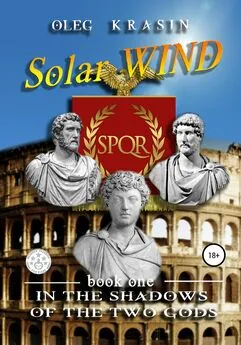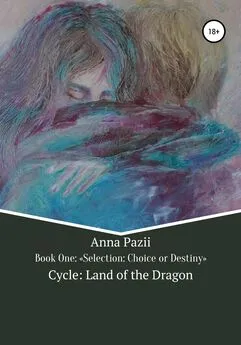Oleg Krasin - Solar Wind. Book one
- Название:Solar Wind. Book one
- Автор:
- Жанр:
- Издательство:неизвестно
- Год:2022
- ISBN:нет данных
- Рейтинг:
- Избранное:Добавить в избранное
-
Отзывы:
-
Ваша оценка:
Oleg Krasin - Solar Wind. Book one краткое содержание
MARCUS AURELIUS ANTONINUS
The emperor-philosopher, for a moment, thanks to him, the world was governed by the best and greatest man of his age.
Solar Wind. Book one - читать онлайн бесплатно ознакомительный отрывок
Интервал:
Закладка:
“I'll talk to Domitia about it,” Hadrian continued. “I hope you don't mind. Now, let's go and visit the thermals. They are my pride. There you will see incredible sea monsters in marble columns and bas-reliefs with newts and nereids.”
He rose, making an inviting hand, and they went to the baths, following the wide slab paths, in the shade of graceful porticos, accompanied by sharp cries of peacocks, which walked importantly on the grass.
In the evening, after a hearty lunch, Marcus retired to his room, the air of which had before refreshed with saffron and cinnamon, and lay down on the bed.
Thoughts, impressions overwhelmed him, because he had never been so close to the emperor. And now he spent his hours with him, listening to amazing stories about Greece, Egypt, Antiochus. Caesar was a great connoisseur of the arts and customs of these countries. Someday, Marcus would be able to sit on a speed galley and go on a journey to see the whole world civilized by the Romans.
It would be his own wanderings and his own impressions. And he too would talk about them, and listeners would also listen to him with burning eyes.
“Are you still awake, Marcus?”
On the doorstep of the room there was the slender figure of his mother. They often did so; Domitia Lucilla came to him before going to bed, sat down by her son's legs, asked about what he cared about, shared herself. These trust filled conversations became a habit for them and may seem strange only to the perverted mind.
Now they were eager to discuss the news related to Marcus's receipt of the toga virilis. For them it was an unexpected mercy of Caesar, although Domitia suspected that it was not without the favorable influence of Sabina. Despite the fact that the couple would quarrel, and for several years the couple did not live under the same roof, Adrian still listened to his wife.
“The emperor likes you very much,” Domitia Lucilla said. “It gives our family the right to hope for future graces. Oh, gods, we must not lose our luck!”
“I swear to Jupiter, I will try, Mother!” Marcus promised embarrassingly, recalling Hadrian's burning eyes.
The obligation given to him by his mother imposed on him a special vow of obedience, but it had clear boundaries. What if Hadrian wanted to see him as Antinous, not a Greek young man, but a Roman? However, Antinous was not as noble as Marcus, and the connection of patrician with the freedman was never forbidden. But Marcus's was different business.
Won't he dishonor the family, disgrace her with his close relationship with Caesar?
He did not convey his anxieties and doubts to his mother. Why bother her? Why put before her and great-grandfather Regin the difficult choice? Although for Regin, probably, there was no dilemma in such a delicate and important issue. Marcus felt that his great-grandfather was ready for anything because of the power, even to sacrifice his grandson or, at least, part of his body.
Moonlight already made its way into the narrow window holes when Domitia Lucilla left her son. She carried away an oil lamp and her wandering light, moving along the corridor further and further, plunging the room into darkness. Only the aroma of Paestum roses still hung in the air—in Hadrian's Palace it was added everywhere, even in oil lamps.
Warm, not yet cooled air penetrated into the room, blowing Marcus, promising him sweet dreams. But he was not sleeping, he was thinking about his talk was his mother. Nearby on the table there was a tray of fruit, he stretched, took the dates, ate.
Suddenly, he felt that apart from the night breeze in the room someone else stood there, someone alive. Were there thieves? But the villa was guarded by the Pretorians. The emperor? Marcus helplessly squeezed into the bed, feeling like he was being thrown into the heat.
In the barely discernible moonlight, he saw a white figure approaching him—large, shapeless, like a huge snowball rolling down a mountain. Once in Rome snow fell, which was a rarity, and Marcus and his friends lowered from the Caelian Hill such ice balls. The snowball was getting closer and almost rolling to the bed, it suddenly split, turning into two, clearly distinguishable people.
No, it was not the emperor!
“Who are you?” he asked barely audibly.
“We are slaves in the villa,” one of the figures replied in a girl's voice. “I'm Benedicta. Theodotus is with me.”
“What do you need?”
“We were sent by a great Caesar. He told us to fulfill all your wishes, master.”
“My desires?” Marcus hesitated.
“Of course!” Benedicta laughed with a soft cooing laugh.
Theodotus at this time lit the lamp and put it on a table next to the fruit. Marcus saw a very young, twelve-year-old black boy dressed in a tunic. Benedicta turned out to be a nice girl, also young and slender. She was a little older than Marcus. He also noticed in one of the walls opposite a subtle light beating from an inconspicuous crack. Or from a hole. Someone was watching them. It was Hadrian understood Marcus.
Marcus immediately recalled the words spoken to him in the morning by Caesar about possession, about passion. Hadrian ordered him to let himself go, with his head immersed into the river of desires. But did he really want Marcus to lose his virginity in Tibur? What if it was a test? Perhaps Hadrian wants to make sure that Marcus was able to own himself in difficult moments when he was subjected to temptations that not every mortal can withstand? After all, Hadrian was almost a god, who could control passions. Even his connection with Antinous did not look mad against the background of the orderly and leisurely life that this art lover led.
Antinous could have just been a decoration, an expensive ring on the finger, which could be used for bragging to friends, as if a perfect work of art.
Meanwhile, Marcus felt the girl's fingers on his body. Her hand caressed, stroked his neck, his chest; she fell to her knees. Theodotus on the side step climbed on the bed and lay down next to him. He started kissing Marcus, cuddling him harder and harder. But Marcus instinctively distanced himself from them, from the boy and from Benedicta.
“We went to the thermae, master,” Benedicta said, thinking that Marcus was confused by the smell that usually comes from slaves—the stink of an unwashed body. “We poured odorous reed water on ourselves.”
“No, no!” Marcus muttered, resisting temptation.
He did not know why, why he had to fight, because his body had already surrendered, he felt it.
In his head there were images of Antinous, Psyche, Venus, whose naked sculptures were exhibited in the villa. In the afternoon, Marcus walked with the emperor past them, stopped, considered. Hadrian was silent and did not comment, sometimes looking closely at the young man. There were also busts of Cupids with The Amours. Naked and chubby boys buzzed cheerfully in copper pipes, calling the god Eros; Priapus with protruding phallus, which is a symbol of eternal fertility and the prevention of misfortune.
Meanwhile, Marcus observed that Benedicta has stopped touching him between his legs. She took out her wet arm from under his tunic and wiped it. She clearly did not know what to do next, whether to continue her caresses or, together with Theodotus, leave the master devastated by new sensations. The gap in the wall flashed with a bright reflection, disappeared, and the girl, as if receiving an inaudible order from Hadrian decided to leave the room. She called her little companion.
The lights go out, the curtain falls, the actors go away.
Marcus, leaned back, lay on the bed, feeling his face burning with hot fire and his body melting in a sweet languor. He handled himself. That's what he thought. He withstood the test prepared by Hadrian. But was it really true, did Caesar think so? Marcus didn't know.
Belated difference
Even before coming to Tibur, Hadrian thought about who to appoint as consuls in the new year. 25 25 AD 134.
He sorted through the candidates of patricians, pondered, stroking his stalwart Molossian dog, who ran around the hall, knocking on the tiles with long claws. Hadrian left his beloved greyhound in Greece—he had many dogs at every estate. He liked dogs more than people, because compared to them they demanded nothing but their master's love.
Sometimes he wondered how glorious it would be if dogs surrounded him instead of people. Faithful, unpretentious, inexpensive, big savings for the budget of the country.
This dog's name was Gilax, which in Greek meant “barking”—the nickname Hadrian borrowed from Virgil, although he did not really like this epic poet. He took Gilax with him to hunt, at a time when others preferred to use the Molossian breed only for protection, as guard dogs. However, it was convenient to have a hunter and guard in one person.
The emperor decided on the first consul at once. Titus Vibius Varus from the venerable senatorial family had coped well with the management of Cilicia, where Caesar appointed him governor a few years ago. Now, his skills would come in handy in Rome. Good officials have always been invaluable, under any emperor.
The second candidate caused more difficulty. Which senators to choose? Who should be assigned an important post? Hadrian in the choice did not hold back anything. He recalled a time when his mad predecessor Caligula introduced a horse into the Senate building, wanting to humiliate the venerable and noble elders. But that was not Hadrian's way.
He preferred to cooperate with the Senate rather than quarrel. And although he suspected a hidden opposition inside the patricians, the discontent had been largely squashed when it had first arisen. At the very beginning of his reign, he had destroyed the conspirators, for a bad quarrel is still better than a good war.
After much deliberation, he settled on the ninety-year-old Lucius Julius Servianus.
He, though deep in age, was a mobile man, had a bright mind and a good memory. In addition, he had a lot of experience; he was appointed consul for the third time, was at Domitian, under Nerve, and now he has been under him, Hadrian. In addition to his age, Servianus also had a no less solid appearance. A huge bald head with a big forehead testified to the mind of the owner, and the wide, developed jaws spoke of the firmness of character.
Servianus took office in January, and in the summer the emperor thought he had done the right thing by appointing an elder to the site. With such a reliable person, a zealot of the foundations, but at the same time, with shaky health, there was nothing to fear for power. In addition, Servianus was a relative—Emperor Trajan married him to Pauline, the older sister of Hadrian. Almost twenty years of age difference between the spouses did not confuse anyone, although the young groom was then fifty.
He accepted Servianus.
“Welcome to you, my dear Lucius!”
Hadrian spread his arms wide and cordially and hugged the old consul.
“Thank the gods, Caesar! You look good. I've been told about your illnesses, but I didn't really believe it. I keep remembering that hunt where you hit a lion running right at us with a spear.”
The Emperor frowned for a moment—his court medic Hermogenes chatted too much—but still managed to keep a friendly expression on his face.
“I have ailments, Servianus. They pass quickly thanks to the gods, and of course Asclepius. 26 26 In ancient Greek mythology, the God of medicine and healing.
Illnesses bypass me. And yet, I'm about to be sixty, the stars advise me to choose an heir. Sabina and I have no children, it's time to choose a worthy patrician, who will continue to rule the state with honor.”
Интервал:
Закладка:










